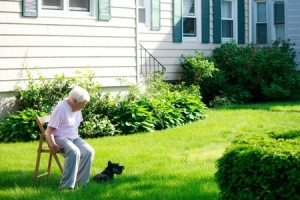Dementia Care Los Angeles – Knowing When It’s Time
by Christine EdwardsAssisted living may be a safer and happier option. Neighbors alerted our family when my grandmother, who had been diagnosed with Alzheimer’s, started letting her dog go out to urinate over and over again, seemingly forgetting he’d just been out. Her friend living nearby had a similar issue; he began to get disoriented and lost on his daily walk. And it’s not unusual for dementia sufferers to leave things on the doorstep or subscribe to an inordinate number of magazines. Such easily visible incidents are a clear indication that more help is needed.
Neighbors alerted our family when my grandmother, who had been diagnosed with Alzheimer’s, started letting her dog go out to urinate over and over again, seemingly forgetting he’d just been out. Her friend living nearby had a similar issue; he began to get disoriented and lost on his daily walk. And it’s not unusual for dementia sufferers to leave things on the doorstep or subscribe to an inordinate number of magazines. Such easily visible incidents are a clear indication that more help is needed.
The decision to transition a loved one with dementia into assisted living can be complicated. Is your loved one really fine or is he or she masking needs? Are you overlooking concerning behaviors or is your family member capable of self-care for a little longer? Families can alleviate undue worry and make the best decisions for loved ones by learning to spot signs that they need more help.
Bonnie Davis is an elder care adviser with years of experience helping families to transition loved ones into assisted living. She suggests that families look for these and other changes in behavior, such as phoning at odd times. When loved ones call at random hours, it’s because they’ve lost their sense of day and night transitions.
Sometimes, says Davis, medication mismanagement can cause irregular behavior that subsides when the medication regimen is administered properly again; a loved one may have forgotten to take needed medications, forgotten he already took them, or lost track of time and taken a second dose.
More Information on our Los Angeles Dementia Care Program
Trouble remembering daily activities can lead to other worrisome situations. Memory loss can cause missed shopping trips or forgotten ingredients, which can lead to improper eating habits. Failing to eat or hydrate regularly can cause changes in behavior, lead to mood swings and alter the impact of medication.
If your loved one is a pet owner like my grandmother, watch for changes in care and feeding routines. Professional care provider Linda Aurigema’s mother-in-law, who had been diagnosed with Alzheimer’s, began absentmindedly overfeeding her dog. “You could see her [illness] progressing and [her health] declining through the animal,” Aurigema said.
Vision tends to worsen with age, which presents yet another challenge. Aurigema encourages families to watch for unexplained dents and dings in vehicles, which may indicate your loved one is having a difficult time behind the wheel.
Bonnie Davis notes that dementia affects a person’s ability to execute higher-level functioning skills, such as making logic-based decisions. She cautions that dealing with mail, money or numbers in general can be overwhelming for those with dementia because they are no longer equipped to make strategic decisions. Families should watch for missing money, odd transactions and late payment on bills.
Visit our Los Angeles Dementia Care Community
Get Help
Does your loved one leave the front door wide open or forget to bring groceries inside the house? When family doesn’t live immediately adjacent, someone nearby who is accustomed to set routines may be the first to notice unusual behavior. Without giving away personal health information or violating confidence, you may want to leave your contact number with a trusted neighbor “just in case,” so you can step in before safety is at risk.
Davis warns that loved ones may hide alarming situations out of embarrassment or fear of change. They cling to habitual behaviors for comfort and security during what she describes as “a disorienting situation.” For family members living nearby, unannounced visits at varying times can reveal how their loved one is holding up throughout the day, and whether or not daily routines are manageable.
If your family member has a care provider, enlist that person for updates and suggestions. Years of expertise, regular visits and awareness of an individual’s medical history enable a care provider to spot potential issues and provide fair warning.
The Next Step
Adult children often feel they should care for their parents even if they can’t provide the level of support professionals can offer. The parent/child relationship can complicate the situation, whereas outside care providers can lend a necessary level of professionalism. “I do this for a living, and I couldn’t take care of my own mother,” Aurigema said.
Davis sympathizes with adult children who are accustomed to being guided by their parents, but now find themselves making tough choices on behalf of mom or dad. To be successful, she believes the dialogue between parent and child has to change. The child has to be the strategist when he or she is used to relying on the parent, which in itself is a major transition in family dynamics.
Isolation contributes to the problem, which is one reason many patients diagnosed with dementia are happier in an assisted living situation with the built-in companionship it provides. They may also appreciate having regular meals, medication administration and regularly scheduled entertainment that doesn’t require transportation.
After considering all factors, if the best choice is for your loved one to transition to assisted living, Davis recommends that families “ambassador that change.” The sooner the family facilitates the move, she notes, the sooner the situation will improve.
